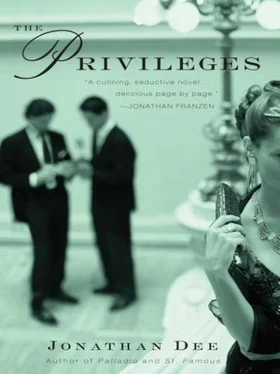“Where do we come from?” she demanded of them. “What country?”
Stunningly, they seemed less than sure. Adam knew his father’s family had come from England, but he didn’t know where in England specifically, nor how many generations ago that had been; his mother’s family was part German and part Dutch. Cynthia knew her father’s ancestors were Russian, unless he’d been lying about that too, and as for her maternal grandparents, her mother had always refused to discuss them.
“Was there something special about the month of April?” April asked. There wasn’t. No historic event had taken place then, no anniversary or birthday, though they did offer that if April’s birthday had actually fallen in April, they would have named her something else.
“What would you have named me instead?” she persisted. The revelation that she, April, might just as plausibly have been Samantha or Josephine or Emma, that only chance was behind the whole solemn question of her identity, made her feel worse than ever. She could see that her parents were now upset, but she was angry at them and didn’t care. They kept coming back to beauty, but it was a beauty she couldn’t comprehend and that she wasn’t at all sure her teacher would consider a satisfactory completion of the assignment.
Ms. Diaz was nice about it, of course, but there was nothing to be done about the jealousy engendered by the other, longer name-essays that went up on the walls above their lockers, stories of honored relatives and cool languages and religious rituals tended through the generations. April felt as if her family came from nowhere, and, more puzzlingly, that this suited her parents just fine.
The next unit was family traditions. The teacher took pains to define this idea as broadly as possible; still, what traditions did April’s family have? They hardly ever did the same thing even twice. They had no ancestral home they returned to, no church they attended (her mom had gone to church as a child but April had heard her say that she hated it and was glad she never had to go again), no special place they liked to travel to — indeed, having been someplace on vacation once, like Nantucket or Vail or Disney World, even if they’d had a good time there, was usually cited as a reason not to go there again. Even their Christmas tree wasn’t in the same spot every year. April knew her own grandparents so little that she sometimes mixed them up in her head and was shy about talking to them on the phone. She had one uncle and no aunts, just something her mother called a step-aunt, whom she’d only ever seen in a photo in her parents’ wedding album.
Soon the whole temper of the assignment had changed, in April’s mind, from an exercise in self-discovery to an indiscriminate hunt for what Ms. Diaz, for whom she would have died in any case, wanted to admire in her. It seemed perfectly defensible to start making things up. She wrote down that her family went to Saint Patrick’s Cathedral every Sunday, and that they were considering a trip to Jerusalem for Christmas. Her grandmother on her mother’s side, who was named May, had lost her parents as a girl but had gamely made her way from Holland to America by boat. Every summer April and her cousins gathered for a reunion at the family estate on a mountain in New Hampshire. It was so big that some of her distant pioneer relatives were buried in a small graveyard right there on the place.
Adam and Cynthia read these notions on the wall beneath their daughter’s self-portrait on Parents’ Night, mute with amazement. April’s teacher couldn’t really believe this stuff, could she? Yet she had posted it right there with all the other handwritten, dubiously spelled histories of perseverance and hardship. They already felt conspicuous, as they always did at these school functions, as the youngest couple in the classroom; at twenty-nine they were still strikingly young, by Manhattan standards at least, to be parents at all. Jonas’s best friend in kindergarten had once slept over for a whole weekend while his father took his mother to London for her fiftieth birthday. Every Parents’ Night Adam and Cynthia were a kind of generation unto themselves, and it didn’t take much, in that context, to awaken a vestigial unease about being in some sort of trouble they didn’t even understand. When Ms. Diaz, deep in conversation with some kid’s father who was surely old enough to be their father too, smiled at them from across the room as if to say that she would be with them in just a moment, they smiled back warmly until she turned away and then Cynthia squeezed his arm and they got the hell out of there.
When she’d first stopped working outside the home, as the expression went, the kids were toddlers with unsynchronized nap schedules and so Cynthia’s brain was pretty much indentured to them; even apart from the physical exhaustion, it was a struggle just to find a little interior space for herself, a little space in which to be herself, when they were so present and so vulnerable and so demanding every minute of the day. The only time that truly felt like her own was late at night when everyone else was asleep, when she would stay up and watch movies and savor the day’s one cigarette, blowing the smoke out the window; but even that came at a price, since the sleep she lost made the next day’s selflessness harder to maintain.
But now they were older, the school day was longer, and she determined that she could pick up where she left off and start working again. She took this idea more literally than she would have if she’d thought about it more. Her first and only job in New York, from the summer after college until after Jonas was born, had been as an editorial assistant at a glossy, ad-heavy magazine called Beauty , and in the absence of any other sort of work she particularly burned to do, she thought she might go back there. It was a painful miscalculation. Her best memories of Beauty were mostly memories of the kind of euphoric bitching that took place over drinks after work with her fellow assistants; most of those smart young women and gay men were now, like Cynthia, long gone, but a couple had stuck it out and managed to rise up the masthead. That was the only way to get anything decent out of a career in magazines — become a lifer. The current features editor was someone she used to eat cheap lunches with back when they were happy to get through the day without getting screamed at by someone important. Her name was Danielle. Cynthia left a message with Danielle’s assistant, got a call back from a different assistant asking her to come in the following Monday at eleven-thirty, and arrived to find Danielle standing up behind her desk with a look of awkward condescension on her narrow face that said everything there was to say.
Still, they had to go through with it. Cynthia, angry and humiliated and eager to leave before Danielle had even sat down again, produced pictures of April and Jonas. Danielle told the story of her own broken engagement. They recalled some of the people they had worked with back in the day. Cynthia had no idea what had happened to any of them; Danielle knew what had happened to all of them. It was possible to connect the overbearing power chick she was now to the emotionally manipulable peon she had been back then, but just barely. Finally they came with mutual reluctance to the subject at hand.
“Come on,” Cynthia found herself saying. “I’m smart and I work hard and I can tell a good idea from a shitty one. If that was true three years ago it can’t be untrue now. Children don’t actually make you stupid — you do know that, right? Or maybe that would make a good investigative piece for you.”
What kept her there past the point of good sense was her imagination of the dismayed, relieved, pitying expression into which Danielle’s face would resolve the moment her office door closed between them. She postponed that moment as long as she could, even when doing so came off as begging. “You don’t want what I can offer you,” Danielle kept saying, and she was right, Cynthia didn’t want it, but even less did she want to be spoken to like a child by someone who used to be her peer and now presumed to tell her what she did or did not want. In the end, in a thoroughly bridge-burning mood, she wrote “eat me” across the top of the résumé she’d brought, slid it across Danielle’s desk, and walked out.
Читать дальше












